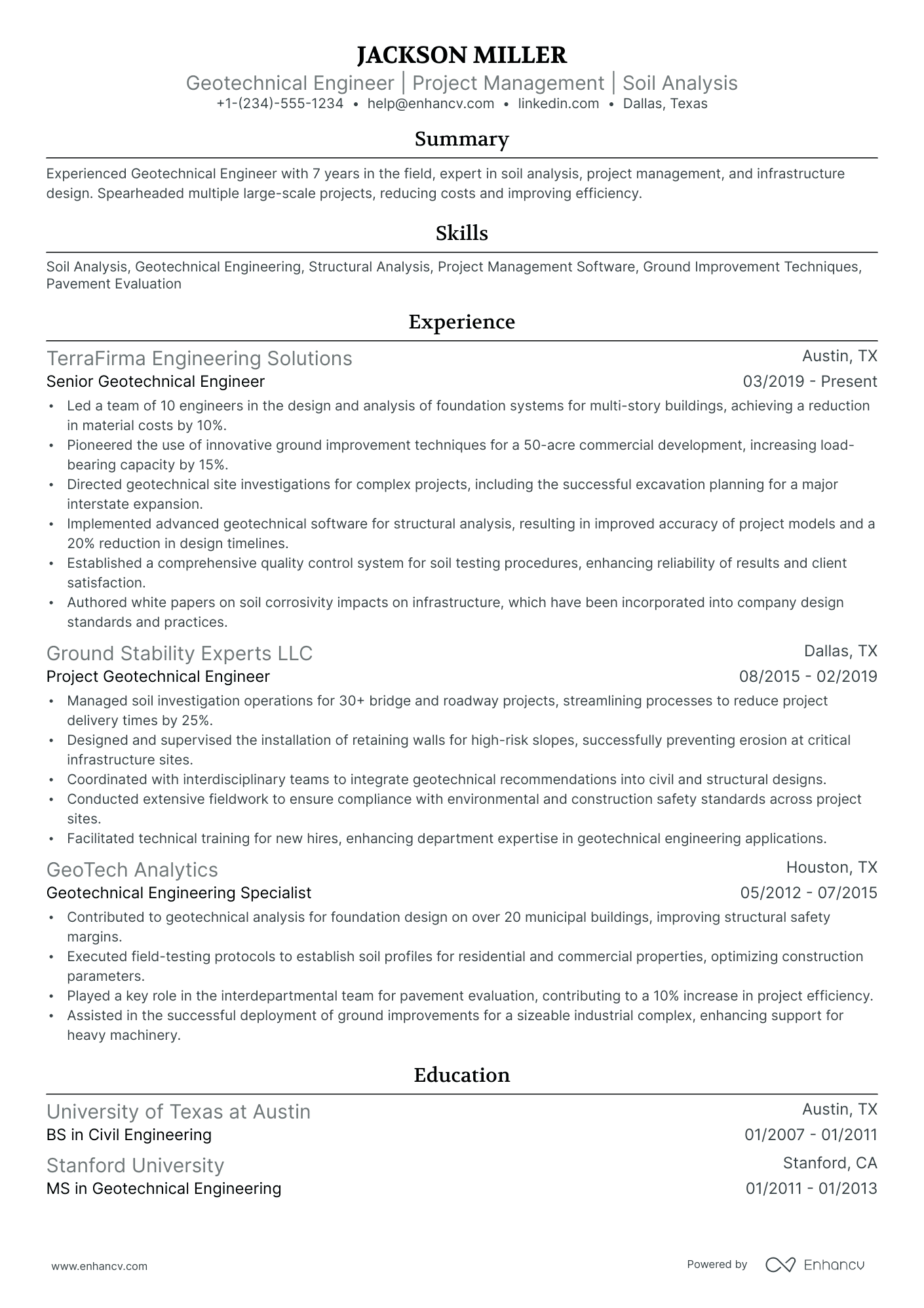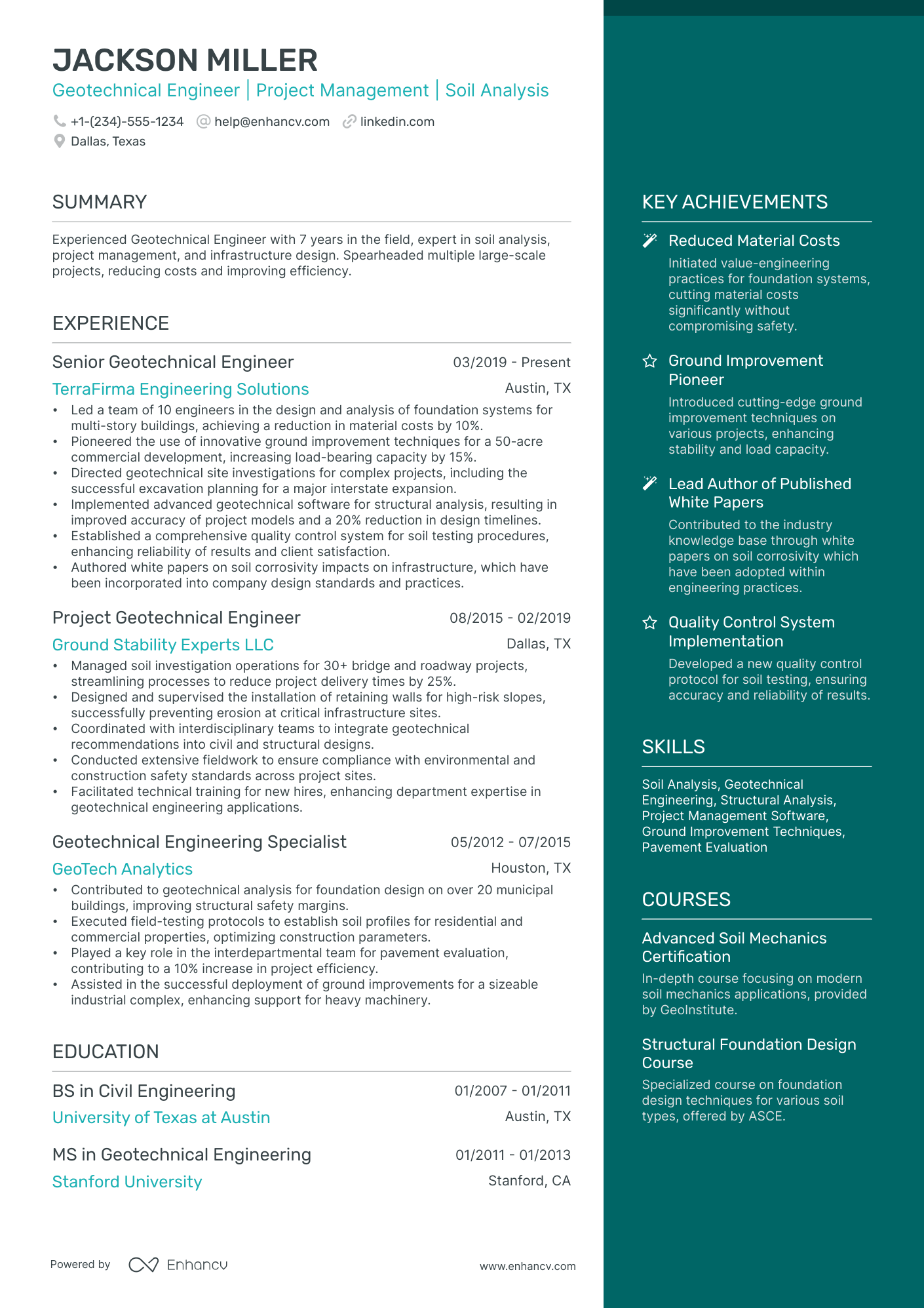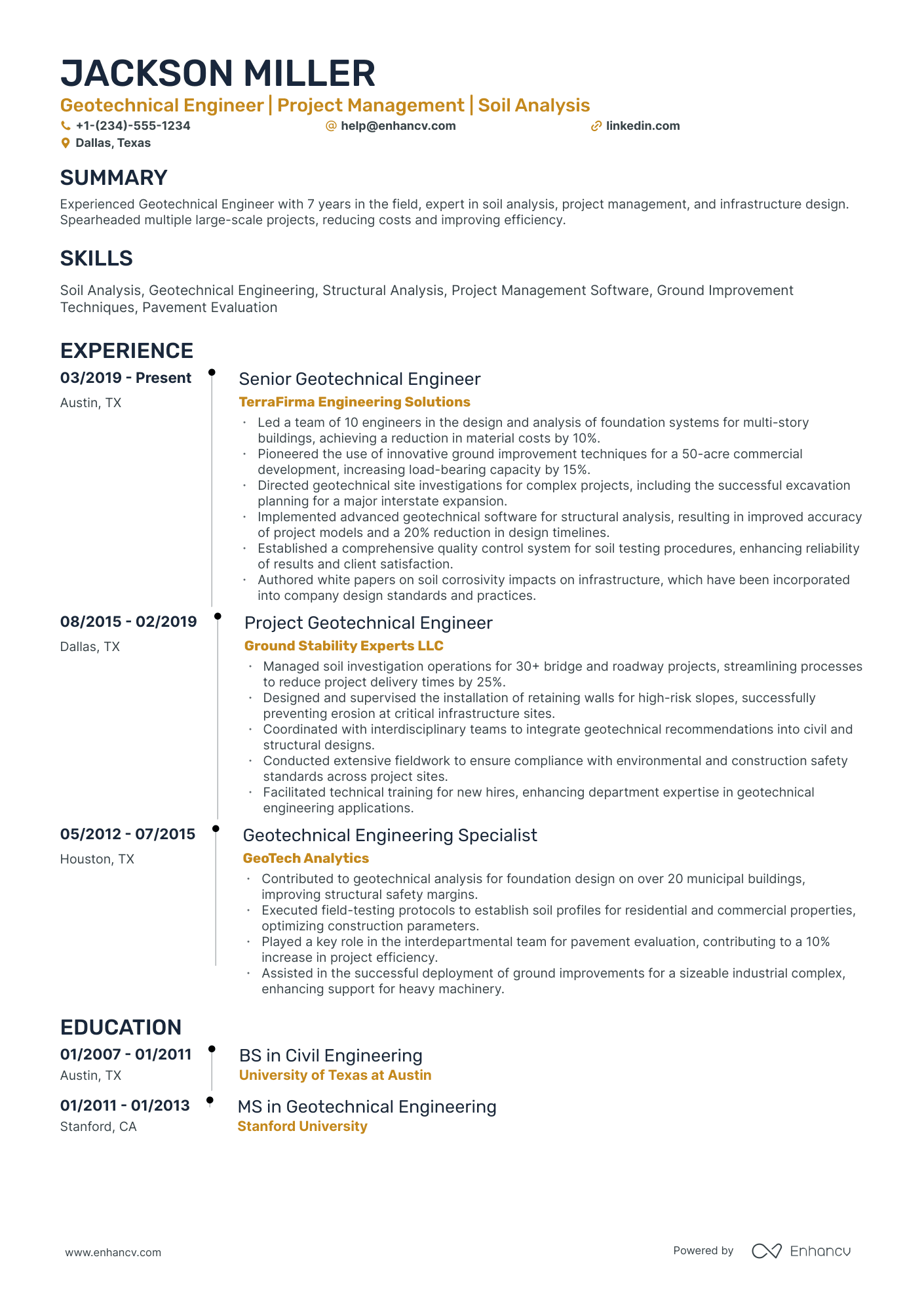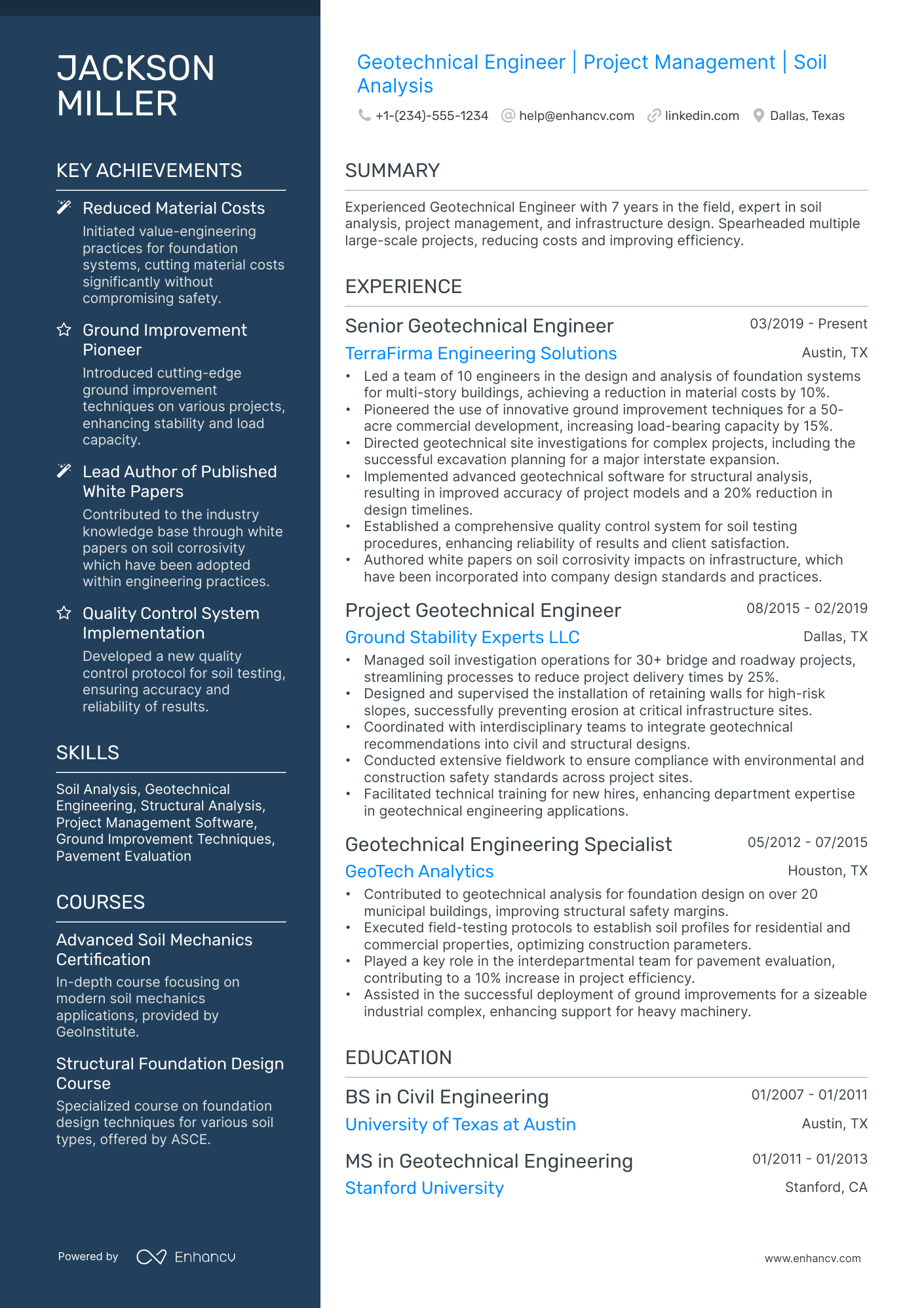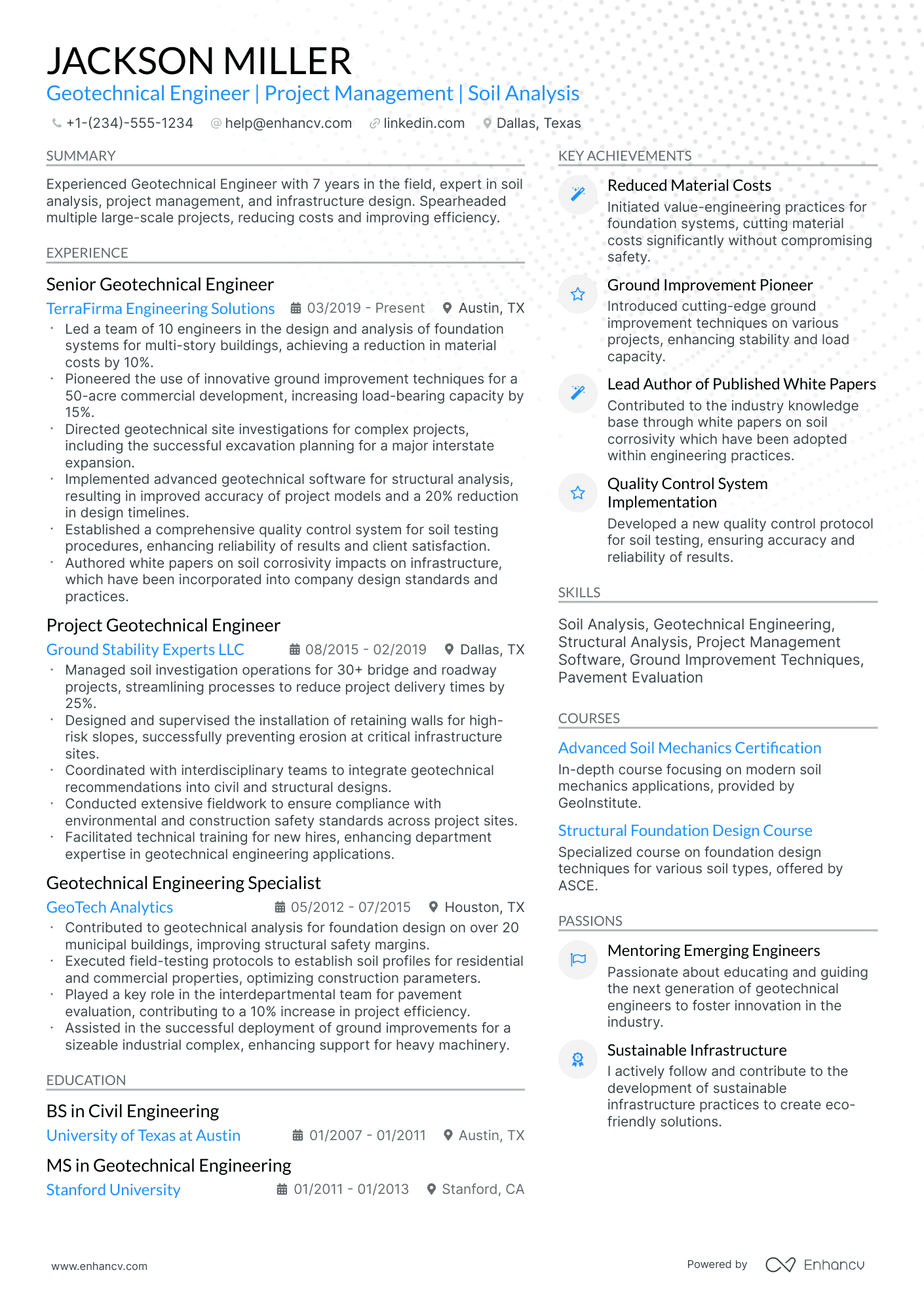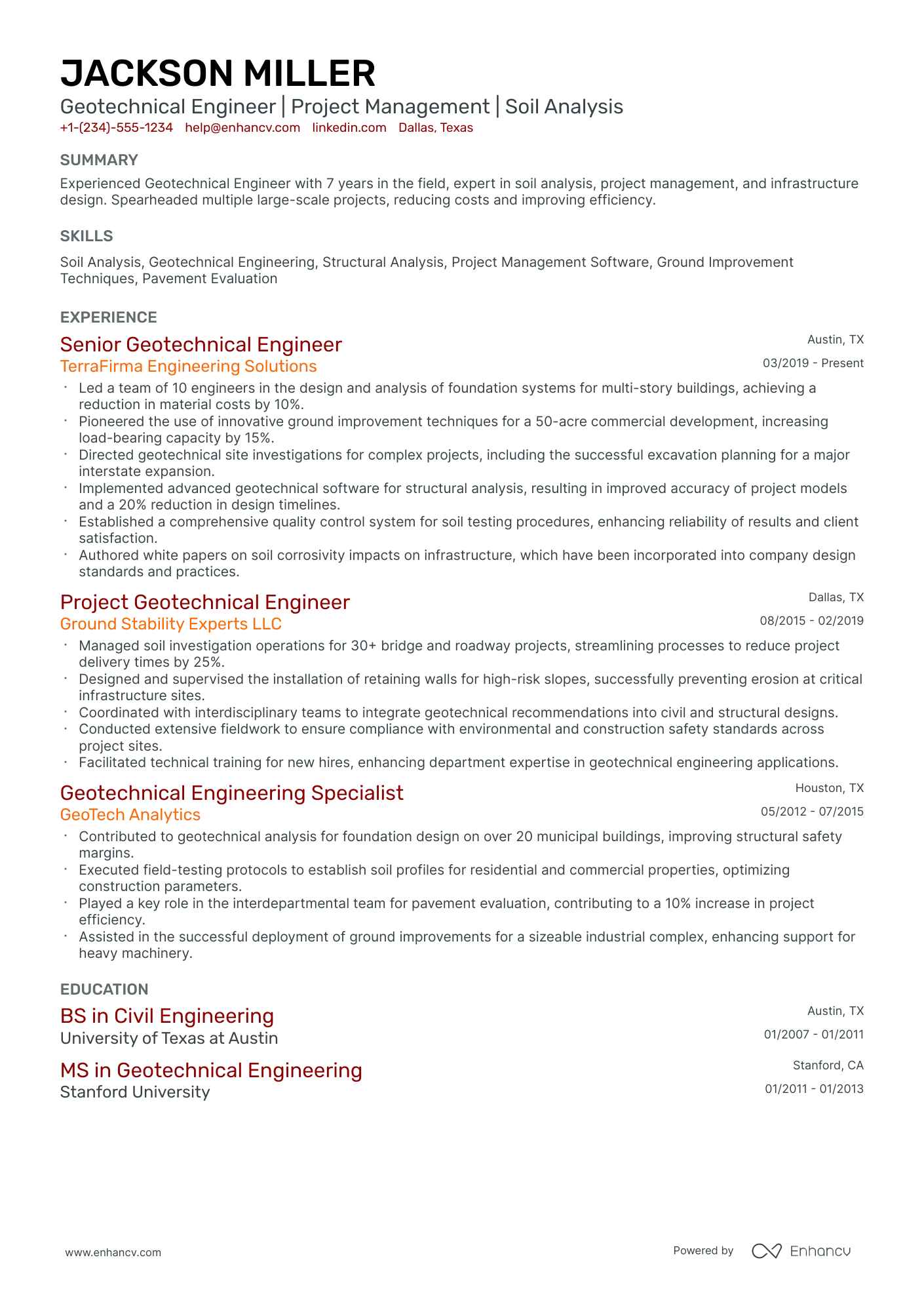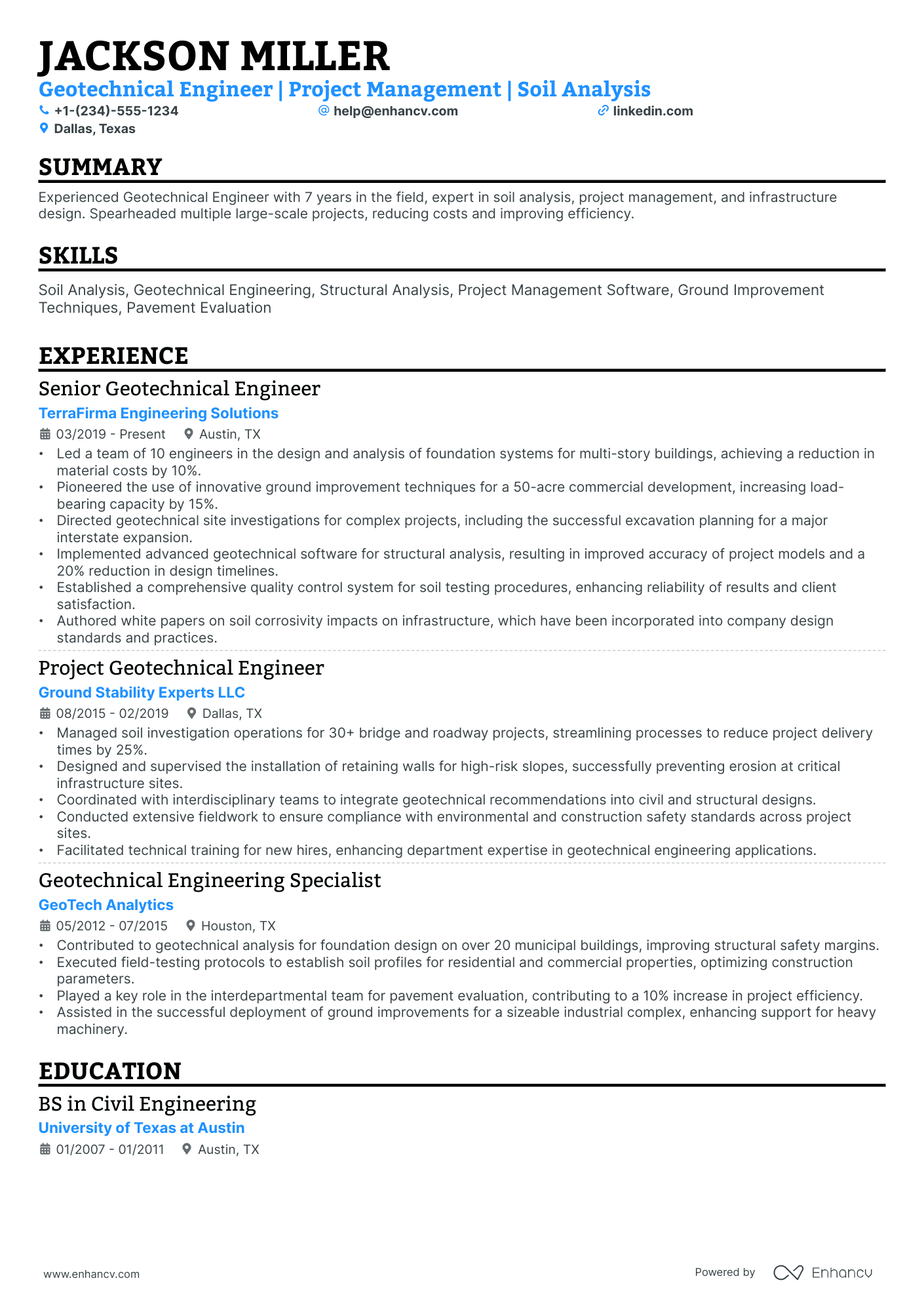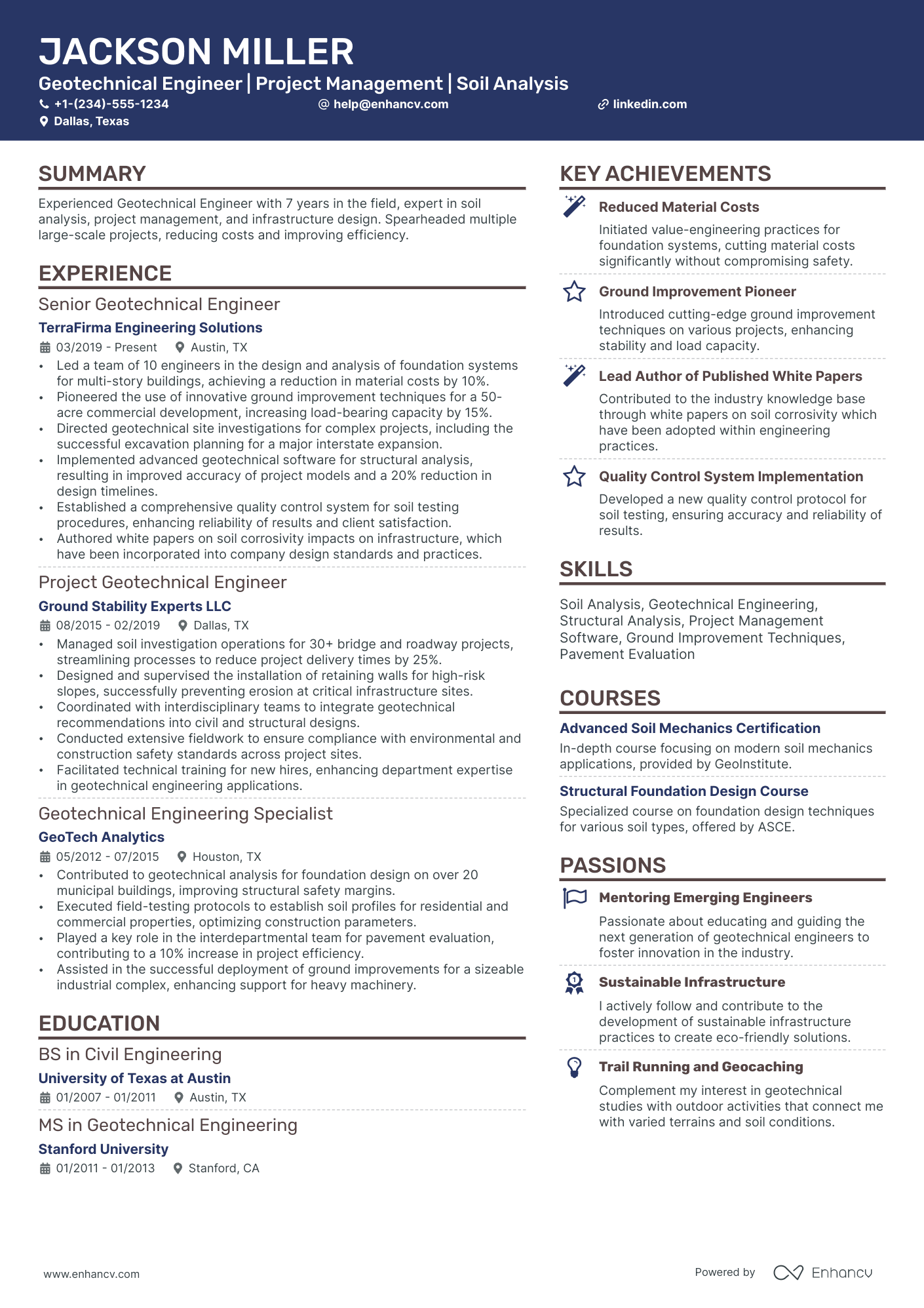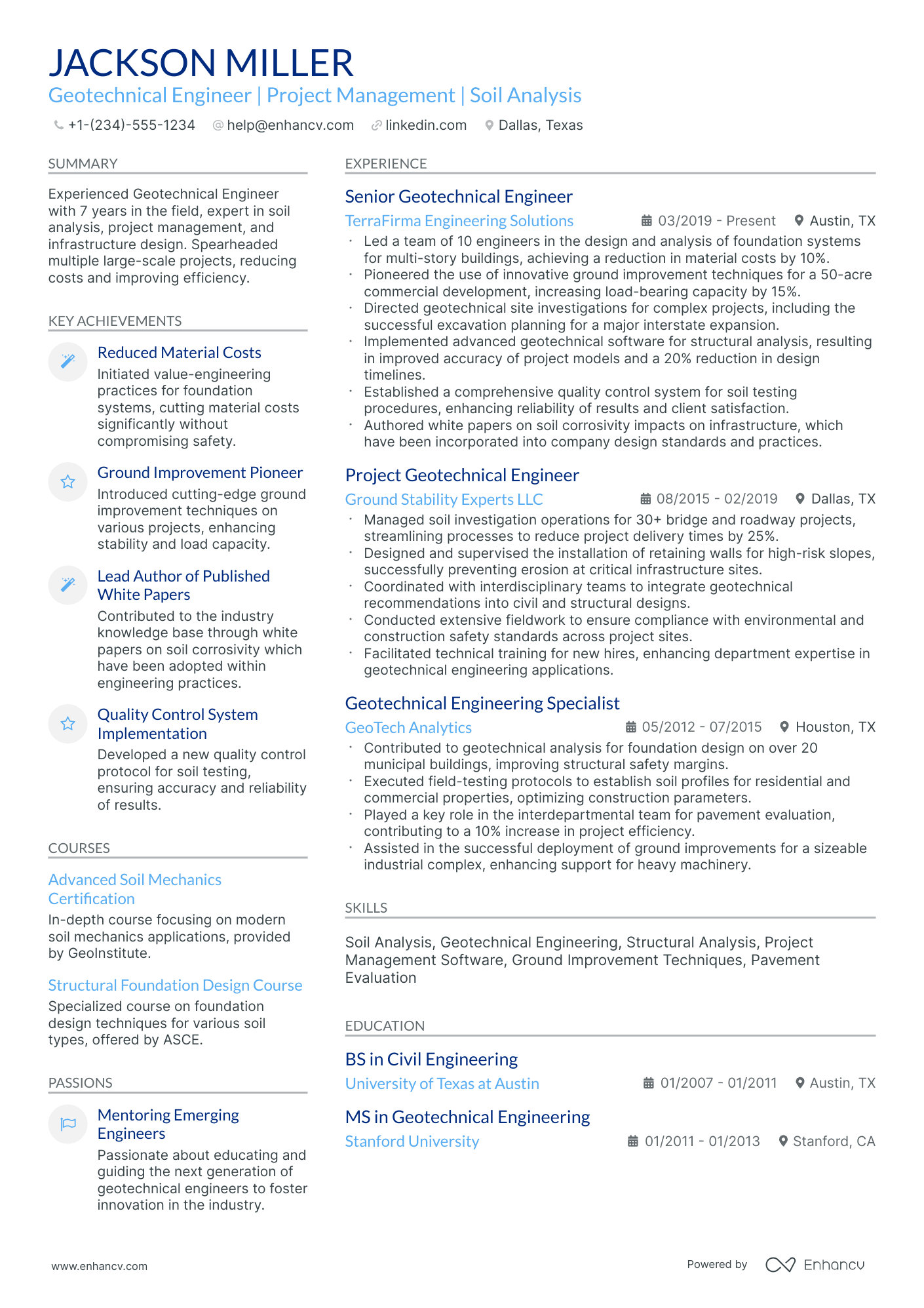As a geotechnical engineer, you may struggle to highlight your complex project experiences effectively on your resume, ensuring that non-specialist HR managers understand your value. Our guide will provide you with tailored strategies to articulate your technical skills and project accomplishments in an accessible manner that resonates with diverse audiences.
- Sample industry-leading professional resumes for inspiration and geotechnical engineering resume-writing know-how.
- Focus recruiters' attention on what matters most - your unique experience, achievements, and skills.
- Write various resume sections to ensure you meet at least 95% of all job requirements.
- Balance your geotechnical engineering technical expertise with personality to stand out amongst candidates.
If the geotechnical engineering resume isn't the right one for you, take a look at other related guides we have:
- Landscape Architect Resume Example
- Construction Worker Resume Example
- Aerospace Engineering Resume Example
- Engineering Program Manager Resume Example
- Construction Superintendent Resume Example
- Engineering Project Manager Resume Example
- Architectural Project Manager Resume Example
- Construction Manager Resume Example
- Electrical Manager Resume Example
- Energy Manager Resume Example
How to style your geotechnical engineering resume: layout and format
When creating your geotechnical engineering resume, have you ever wondered how long it should be? Experts point out that it should be between one and two pages. Choose the longer format, if you happen to have over a decade of relevant experience. What is more, resume formats play a crucial role in presenting your experience. Use the:- Reverse-chronological resume format to highlight your experience;
- Functional skill-based resume format if you have less experience and want to focus on skills;
- Hybrid resume format to guide recruiters through both your experience and skills.
- Make sure your headline is simple and includes the job you're applying for or your current role, an abbreviation of a certificate you have, or even your professional area of interest;
- Always tailor your geotechnical engineering resume to the role you're applying for by matching job requirements to your experience via different resume sections;
- Once you've created your resume, download it in PDF (unless otherwise specified). This is to ensure readability and that the layout remains fixed.
Keep in mind the market you’re applying to – a Canadian resume, for instance, might have a unique layout.
Upload & Check Your Resume
Drop your resume here or choose a file. PDF & DOCX only. Max 2MB file size.
PRO TIP
List your educational qualifications and certifications in reverse chronological order.
Traditional sections, appreciated by recruiters, for your geotechnical engineering resume:
- Clear and concise header with relevant links and contact details
- Summary or objective with precise snapshot of our career highlights and why you're a suitable candidate for the geotechnical engineering role
- Experience that goes into the nuts and bolts of your professional qualifications and success
- Skills section(-s) for more in-depth talent-alignment between job keywords and your own profile
- Education and certifications sections to further show your commitment for growth in the specific niche
What recruiters want to see on your resume:
- Relevant geotechnical engineering Skills: Proficiency with geotechnical software (e.g., PLAXIS, GeoStudio) and knowledge in slope stability analysis, foundation design, and soil mechanics.
- Professional Geotechnical Experience: Hands-on experience with in-situ testing (e.g., SPT, CPT), lab testing of soil samples, ground improvement techniques, and geotechnical report writing.
- Educational Background: A degree in Civil or geotechnical engineering, often with post-graduate qualifications or certifications (e.g., P.E. license).
- Project Management Capabilities: Experience in managing geotechnical projects, including project planning, budgeting, and site supervision.
- Health, Safety, and Environmental Awareness: Demonstrated understanding of best practices in HSE, particularly those relating to ground engineering and construction work.
Adding your relevant experience to your geotechnical engineering resume
If you're looking for a way to show recruiters that your expertise is credible, look no further than the resume experience section.
Your geotechnical engineering resume experience can be best curated in a structured, bulleted list detailing the particulars of your career:
- Always integrate metrics of success - what did you actually achieve in the role?
- Scan the geotechnical engineering advert for your dream role in search of keywords in the job requirements - feature those all through your past/current experience;
- Dedicate a bullet (or two) to spotlight your technical capabilities and how you're able to use the particular software/technology in your day-to-day roles;
- Write simple by including your responsibility, a job advert keyword or skill, and a tangible outcome of your success;
- Use the experience section to also define the unique value of working with you in the form of soft skills, relevant feedback, and the company culture you best thrive in.
Industry leaders always ensure that their resume experience section offers an enticing glimpse at their expertise, while telling a career narrative. Explore these sample geotechnical engineering resumes on how to best create your resume experience section.
- Supervised the geotechnical exploration and testing phase for a major highway overpass, analyzing soil samples and creating detailed reports which were pivotal in the structural design process.
- Managed a team of geotechnical engineers and technicians, improving team performance and project delivery timelines by 30% through the implementation of new project management software and training programs.
- Coordinated with several departments on the construction of a 50-story high-rise building, ensuring all geotechnical recommendations were incorporated, which enhanced the building’s stability and safety.
- Designed and executed a comprehensive slope stability plan for a large open-pit mine that decreased landslide occurrences by 40% in a year, significantly enhancing worker safety and operational uptime.
- Developed a cost-effective ground improvement strategy for a large residential development on soft soils, reducing projected construction costs by 20% while meeting stringent safety standards.
- Instituted an innovative monitoring program using piezometers and inclinometers that led to early detection of potential ground movements around critical infrastructure, averting catastrophic failures.
- Conducted extensive seismic risk assessments for building projects in earthquake-prone areas, delivering comprehensive mitigation strategies to clients that led to a 25% reduction in insurance premiums.
- Played a key role in the development of an innovative soil-nailing technique that expanded the company’s service offerings and resulted in a 15% increase in annual revenue from new market sectors.
- Authored several technical papers on advanced soil testing methods, positioning the company as a thought leader in the industry and enhancing its reputation among peers and clients.
- Led the geotechnical design and analysis for a $200 million waterfront redevelopment project, significantly reducing potential subsidence issues and ensuring a resilient foundation for future structures.
- Established a new standard operating procedure for in-situ testing that increased testing efficiency by 35%, thereby streamlining project timelines and lowering costs for the clients.
- Represented the company at international engineering conferences, demonstrating the firm’s commitment to sustainable engineering practices and expanding its network by 25%.
- Orchestrated a collaborative research project between the company and a local university, which led to the development of a new predictive model for landslide susceptibility.
- Directed the geotechnical site investigation for a large-scale wind farm project, ensuring compliance with industry standards and contributing to a project that generates 300MW of renewable energy.
- Improved the internal peer review process, which enhanced report quality and reduced error rates by 20%, leading to higher client satisfaction and repeat business.
- Contributed to the geotechnical analysis and foundation design for a complex bridge project that received an engineering excellence award, acknowledging the innovative use of materials and techniques.
- Implemented a geotechnical data management system that improved data accuracy and accessibility, boosting productivity among field and office staff by 25%.
- Negotiated with vendors to upgrade soil testing equipment, which enhanced testing capabilities and reduced turn-around time for lab results by 15%.
- Spearheaded the forensic investigation of a failed earth-retaining structure, identifying critical design flaws that led to changes in national design codes and practices.
- Provided expert geotechnical recommendations for a municipal solid waste landfill expansion, enabling the client to securely double its capacity while adhering to environmental regulations.
- Led professional development workshops, enhancing the team's technical competencies in geotechnical software applications, which maximized project efficiency and accuracy.
- Initiated a geotechnical instrument installation program for remote monitoring of critical infrastructure that reduced site visits and improved safety monitoring by 50%.
- Masterminded a soil improvement research project that reduced material costs by 18% for the company’s major infrastructure projects while maintaining the structural integrity of the foundations.
- Engaged in multidisciplinary site development projects, liaising with environmental scientists, and architects, to ensure that best practice geotechnical principles were seamlessly integrated from concept to construction.
Quantifying impact on your resume
- Quantify the number of geotechnical investigations you've conducted to demonstrate experience volume.
- List the types and sizes of projects you've worked on to show the scope of your expertise.
- Include the amount of cost savings through optimized material selection or construction techniques.
- Describe the software tools you're proficient in, including the number of years of experience.
- Display the number of cross-disciplinary teams you've collaborated with to highlight teamwork skills.
- Mention the percentage of projects completed within the deadline to showcase efficiency.
- State the number of technical reports you've authored or contributed to affirm your writing abilities.
- Detail the extent of your responsibility by citing the number of personnel supervised or mentored.
Action verbs for your geotechnical engineering resume
Four quick steps for candidates with no resume experience
Those with less or no relevant experience could also make a good impression on recruiters by:
- Taking the time to actually understand what matters most to the role and featuring this within key sections of their resume
- Investing resume space into defining what makes them a valuable candidate with transferrable skills and personality
- Using the resume objective to showcase their personal vision for growth within the company
- Heavily featuring their technical alignment with relevant certifications, education, and skills.
Remember that your resume is about aligning your profile to that of the ideal candidate.
The more prominently you can demonstrate how you answer job requirements, the more likely you'd be called in for an interview.
Recommended reads:
PRO TIP
Always remember that your geotechnical engineering certifications can be quantified across different resume sections, like your experience, summary, or objective. For example, you could include concise details within the expertise bullets of how the specific certificate has improved your on-the-job performance.
How to showcase hard skills and soft skills on your resume
Reading between the lines of your dream job, you find recruiters are looking for candidates who have specific software or hardware knowledge, and personal skills.
Any technology you're adept at shows your hard skills. This particular skill set answers initial job requirements, hinting at how much time your potential employers would have to invest in training you. Showcase you have the relevant technical background in your communicate, solve problems, and adapt to new environments. Basically, your interpersonal communication skills that show recruiters if you'd fit into the team and company culture. You could use the achievements section to tie in your greatest wins with relevant soft skills.
It's also a good idea to add some of your hard and soft skills across different resume sections (e.g. summary/objective, experience, etc.) to match the job requirements and pass the initial screening process. Remember to always check your skill spelling and ensure that you've copy-pasted the name of the desired skills from the job advert as is.
Top skills for your geotechnical engineering resume:
Finite Element Analysis (FEA)
Geographic Information Systems (GIS)
Soil Mechanics
Rock Mechanics
Site Investigation Techniques
Slope Stability Analysis
Groundwater Flow Modeling
Laboratory Testing of Soil
Foundation Design Software
Geotechnical Instrumentation
Problem Solving
Communication
Team Collaboration
Project Management
Critical Thinking
Attention to Detail
Adaptability
Time Management
Decision Making
Analytical Skills
PRO TIP
The more time and effort you've put into obtaining the relevant certificate, the closer to the top it should be listed. This is especially important for more senior roles and if the company you're applying for is more forward-facing.
Maximizing your geotechnical engineering resume: education and certification sections
To effectively showcase your industry knowledge in your geotechnical engineering resume, it's important to properly list your education and certifications.
For the education section, ensure you include:
- Higher education degrees pertinent to the industry or those at a postgraduate level;
- The start and end dates of your education, along with the name of the institution you graduated from;
- Your GPA and relevant coursework, but only if they are impressive and applicable to the role.
Additionally, create a separate certifications section to spotlight your most notable recognitions. Another excellent place to feature a leading industry certificate is in your resume header, right after your name.
Below is a list of key industry certifications that are often sought after by recruiters
The top 5 certifications for your geotechnical engineering resume:
- Professional Engineer (PE) - National Council of Examiners for Engineering and Surveying (NCEES)
- Engineering Intern (EI) or Engineer-in-Training (EIT) - National Council of Examiners for Engineering and Surveying (NCEES)
- Diplomate, geotechnical engineering (D.GE) - The Academy of Geo-Professionals (AGP)
- Certified Professional in Erosion and Sediment Control (CPESC) - EnviroCert International, Inc.
- Geotechnical Special Inspector (GSI) - International Code Council (ICC)
PRO TIP
The more time and effort you've put into obtaining the relevant certificate, the closer to the top it should be listed. This is especially important for more senior roles and if the company you're applying for is more forward-facing.
Recommended reads:
Best practices to your geotechnical engineering resume summary or objective
To start, how do you know if you should include a resume summary or a resume objective ?
- Resume summaries are ideal for geotechnical engineering professionals with more experience, who'd like to give a quick glimpse of their biggest career achievements in the top one-third of their resumes.
- On the other hand, resume objectives serve as a road map for recruiters. Candidates use the objective to show how their experience aligns with the geotechnical engineering role they're applying for while showcasing the North Star of their career (or where they want to be as a professional in the next couple of years).
The resume summary or resume objective could be the perfect fit for your geotechnical engineering resume. The function of both is to highlight your professionalism succinctly. So, keep your writing specific: include no more than four sentences and target your application to the role. Here's how these specific resume sections help the geotechnical engineering candidates stand out.
Resume summaries for a geotechnical engineering job
- Seasoned Geotechnical Engineer with over 10 years of hands-on experience in subsurface investigations and slope stability analysis. Expert in applying numerical modeling techniques to predict soil behavior, significantly reducing project risks and costs. Played a pivotal role in the successful delivery of a multimillion-dollar dam reinforcement project.
- Dynamic Civil Engineer transitioning to geotechnical engineering, bringing forth a robust 8-year background in large-scale infrastructure development. Adept at incorporating geotechnical aspects into design, and committed to mastering site assessment and earthwork engineering to strengthen foundations for future projects.
- Distinguished Environmental Scientist capitalizing on a decade of expertise in soil remediation and contamination control, now pivoting to geotechnical engineering. Eager to apply environmental principles to geotechnical challenges, ensuring sustainable and environmentally conscious soil management practices are at the forefront of construction projects.
- Adept Geotechnical Engineer with 15 years of experience specializing in deep foundation design and ground improvement strategies for commercial and residential structures. Awarded Engineer of the Year for developing innovative soil mix technology that significantly increased load-bearing capacities, leading to a 20% reduction in construction costs for the firm.
- Ambitious graduate with a Master's degree in Civil Engineering, keen on carving a path in geotechnical engineering. Eager to leverage academic knowledge in soil mechanics and passion for practical application of engineering principles to contribute to complex geotechnical projects and collaborate with multidisciplinary teams.
- Aspiring professional with a strong foundation in geology and hydrology, determined to excel in geotechnical engineering. Ready to harness my analytical skills and fervor for geoscience to aid in soil analysis and design innovative solutions for earth retention systems, and to work alongside seasoned experts to gain valuable industry experience.
Miscellaneous geotechnical engineering resume sections for a more personalized approach
Your geotechnical engineering resume can reflect even more upon your personality and best qualities - that is if you decide on including a couple of additional resume sections to support your application.
Some of the best-accepted industry-wide choices include the:
- Resume projects - getting into the outcomes of your most important work, so far;
- Languages on your resume - detailing your proficiency level;
- Special recognitions - dedicated to your most prominent industry awards;
- Hobbies and interests - defining how you spend your free time.
Key takeaways
- Ensure your geotechnical engineering resume uses a simple, easy-to-read format that reflects upon your experience and aligns with the role;
- Be specific within the top one-third of your resume (header and summary or objective) to pinpoint what makes you the ideal candidate for the geotechnical engineering role;
- Curate information that is tailored to the job by detailing skills, achievements, and actual outcomes of your efforts;
- List your certifications and technical capabilities to demonstrate your aptitude with specific software and technologies;
- The sections you decide on including on your geotechnical engineering should pinpoint your professional expertise and personality.
